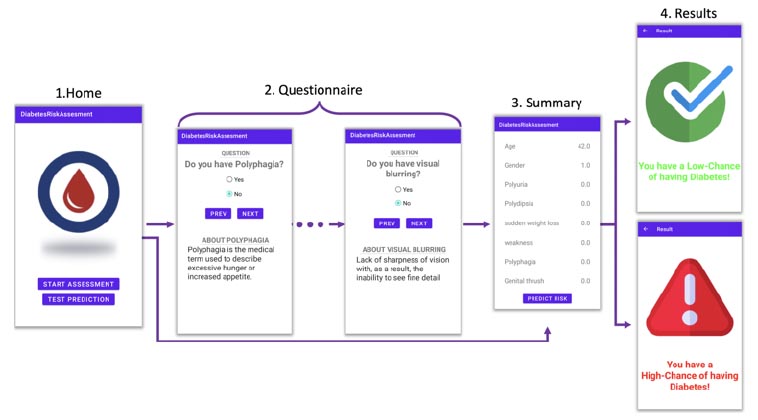October 03, 2022

Mizzou Engineers are bringing artificial intelligence services to the end user through edge intelligence, developing a smartphone app that lets you determine your risk for diabetes. Unlike other tools available, the system would allow you to enter personal health data securely and ensure it remains private.
The app, which is still in the development stage, flags prediabetes, allowing individuals at risk to take steps to reverse the condition before it becomes a disease. That’s important as the Centers for Disease Control and Prevention estimates more than 88 million adults in the U.S. have prediabetes, most of whom don’t realize it.
Md Maruf Hossain Shuvo, a PhD student in electrical and computer engineering, and Professor and Chair Syed “Kamrul” Islam, along with colleagues, used machine learning to develop the automatic screening tool.

Using publicly available data from the University of California at Irvine, Shuvo trained the machine learning model to look for specific indicators such as whether a person is experiencing blurred vision or sore muscles.
“When a person goes to a physician, the physician asks these types of questions before doing anything clinical,” he said. “This is a convenient way to determine your risk before seeking further clinical testing.”
Now, the team hopes to work with colleagues at the MU School of Medicine to expand their database and improve the model.
“With more data we can get better results and make the system more robust to reflect all types of people,” Shuvo said.
Islam presented a paper on the system at the IEEE International Symposium on Medical Measurements & Applications in Messina, Italy, this summer. Other co-authors of the paper are Nafis Ahmed and Jianlin Cheng from computer science, and Humayera Islam, Khuder Alaboud and Abu Saleh Mohammad Mosa from the MU School of Medicine.
Eventually, the app may also be able to help with diabetes management. With the right datasets, the team could train the system to monitor and predict glucose levels, which indicate when a patient needs food, insulin doses or physical activity to prevent possible hypo- or hyperglycemia events.
Shuvo has been working on the project in the Analog/Mixed Signal VLSI and Devices Laboratory (AVDL), where Islam also works on implantable biosensors that monitors blood glucose levels.
Tackle real-world problems alongside leaders in the field. Learn more about electrical engineering and computer science at Mizzou Engineering.